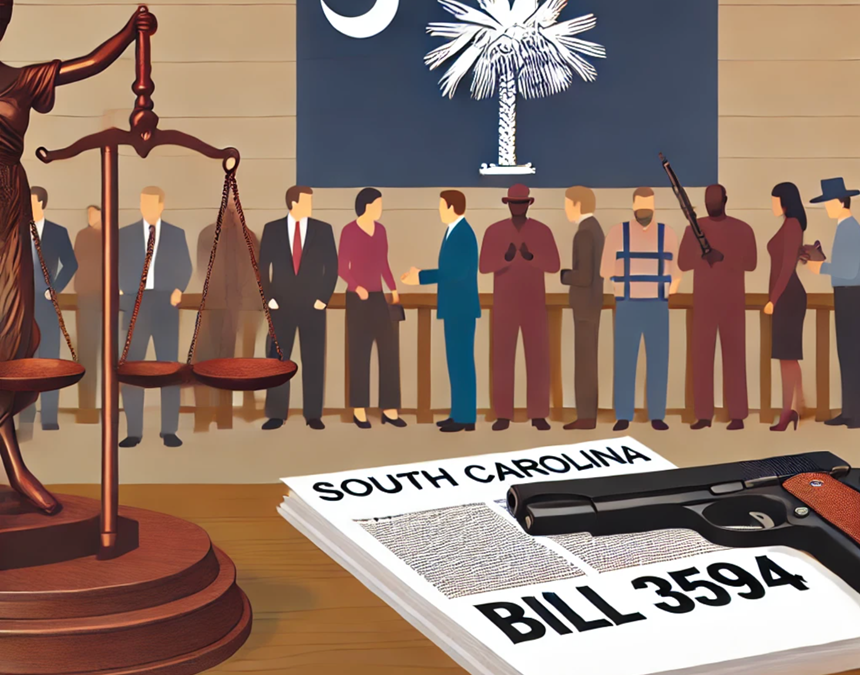On March 7, 2024, Governor McMaster signed into law “Constitutional Carry” (H.3594) in South Carolina.
The new law authorizes anyone who is not otherwise prohibited from possessing a firearm to legally possess a firearm without training or a concealed weapons permit issued by SLED.
This is a significant departure from the previous law.
What does this mean?
This means that as of March 7, 2024, you can carry a firearm without a permit if you are over 18 and not otherwise prohibited from carrying a firearm.
In other words, you can openly carry, conceal carry, and have a firearm anywhere (concealed or open) inside your vehicle.
Additionally, anyone carrying a firearm under this law, whether they have a CWP or not, does not have to notify law enforcement.
Improper Locations to Carry a Handgun
While the law allows for firearms to be possessed in more places, there are still many locations where they are prohibited.
The following places are off-limits for carrying firearms:
- Inside law enforcement facilities
- Detention and correctional facilities
- Courthouses and courtrooms
- Publicly owned buildings where court is in session
- Polling places on election days
- School or college events not related to firearms
- Daycare/preschool facilities
The following places where firearms are prohibited by federal law include:
- Churches or other established religious sanctuaries
- Places where medical services or procedures are performed
- Places marked with a sign prohibiting the carrying of a firearm
Who CANNOT Possess a Firearm in South Carolina?
In South Carolina, possessing a firearm or ammunition is unlawful for a person who has been convicted of a crime that could be punished by a term of imprisonment of one year or more.
This excludes offenses related to regulating business practices (e.g., antitrust violations, unfair trade practices, etc.).
This also excludes offenses classified as misdemeanors punishable by a term of imprisonment of five years or less or crimes that have been expunged or pardoned unless the term of the pardon or expungement provides otherwise.
However, under federal law, certain convictions may still prevent possession of firearms or ammunition. See 18 USC § 922.
How Does this Differ from Where I Could Keep a Handgun in My Vehicle Before?
Under the old law, it was legal to carry a pistol if it was secured in a “closed glove compartment” or “closed console”.
The handgun could have been loaded or unloaded if secured in the glove compartment or console.
You could also carry in another “closed container secured by an integral fastener and transported in the vehicle’s luggage compartment”.
Generally, this meant that if you had an SUV, you could have stored the gun in the back as long as it was in a suitcase, closable bag, etc.
You could also have a handgun in the “closed trunk” of the car as well.
Under the new law, you are now allowed to carry a firearm in your possession, whether it is concealed or not.
This means you can carry a firearm in the trunk, glove compartment, back of the seat, etc. The old section 16-23-20 has been heavily modified.
What about the existing Concealed Weapon Permit Program?
The current CWP program run by SLED is still in place for those who wish to participate, but it is not required.
Having a CWP will give individuals reciprocity with other states that recognize a South Carolina CWP and will make purchasing a firearm from a dealer easier.
Because there is no longer a CWP requirement, if you do have a CWP, you are not required to carry your CWP nor disclose your CWP status to a law enforcement officer.
New Requirement to Report a Lost or Stolen Firearm
If you are an owner or a person lawfully in possession of a firearm, and you discover that the firearm has been stolen or lost, you have ten days from that discovery to report the loss or theft to the appropriate law enforcement agency.
This report must include the facts and circumstances surrounding the loss or theft.
If you are in doubt about whether you can legally possess a pistol, you should consult an attorney.



